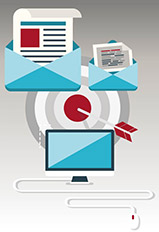

The practice of law, to put it simply and regardless of resistance from some factions, is changing. A big part of that change is the Internet. Lawyers use the Internet on their desktops, laptops, tablets, and smartphones to research, e-file, e-mail, or to play solitaire or the game of the day.
Lawyers are not alone in their use of the World Wide Web. According to a 2014 Pew Research study of the Internet and American life, 84% of adults use the Internet. A number of those users are your clients or potential clients. Your objective is keeping your name current in their minds.
How do you reach them? Try e-mail marketing.
E-mail marketing is still considered the best way to deliver a targeted message to a particular and receptive audience. While it’s true that many e-mail messages are deleted after reading the subject line, it’s also true that e-mails with a message of value to a particular recipient will be read.
As a lawyer, there are two kinds of e-mail campaigns you can use:
- Newsletters sent to those who have given you permission to contact
- Targeted e-mail messages sent to a select group
Newsletters
Newsletters can be sent to present and past clients of the firm who have agreed to receive them. The content should be of interest to that particular client. For example, a family law attorney might send information about a recent Friend of the Court decision; an elder law lawyer could discuss considerations in selecting a patient advocate; a tax lawyer could publish a recent IRS update.
The idea is tailoring the writing to the reader who wants news. You, of course, want to be seen as an expert in your field—a lawyer to whom clients and prospective clients will turn when in need of your service. Provide valuable information and they will keep reading. On the other hand, information about firm changes, new attorneys who have joined the firm, and a description of matters you handled for other clients are not seen as valuable messages. Consider including them at the end of substantive messages.
Targeted E-mail Messages
These messages are designed for a specific group. Perhaps some of your clients are in the transportation business and the spring thaws are starting, so you want to update them on the frost laws in Michigan. A quick message to that group will do the job.
Other readers might only want to know about trusts for pets or a recent decision in health care laws. There are a number of topics that only appeal to a particular consumer. You can use a targeted e-mail message to send them a quick alert.
How you approach your e-mail marketing depends on your resources. If you’re on a tight budget but have downtime to experiment, you can build your e-mail marketing program yourself using an online service. These services walk you through the process of building an e-mail list, choosing a template, distributing your e-mails, tracking them, and managing your list.
Your first problem is deciding which service to use. Study the services and pick one with which you are comfortable. Your second problem is maintaining consistency in delivery. Once a month, every other month, or quarterly—establish a routine that works for you.
If, on the other hand, you don’t have the time or inclination to develop your own e-mail campaign, you can hire someone to set it up and maintain it. If that’s not in your budget, perhaps a college or law student with knowledge in the field can help.
E-mail campaigns, when done well, are effective. They keep your name and expertise prominent in your client’s mind, leading to more referrals and more business. However, remember when posting to the outside world to be aware of your ethical obligations. When in doubt about the ethics of your e-mail communications, call the SBM ethics helpline at (877) 558-4760 before you post.
 Roberta Gubbins has served as the editor of the Ingham County Legal News. Since leaving the paper, she provides services as a ghostwriter editing articles, blogs, and e-blasts for lawyers and law firms. She is the editor of Briefs, the Ingham County Bar Association e-newsletter, and The Mentor, SBM Master Lawyers Section newsletter.
Roberta Gubbins has served as the editor of the Ingham County Legal News. Since leaving the paper, she provides services as a ghostwriter editing articles, blogs, and e-blasts for lawyers and law firms. She is the editor of Briefs, the Ingham County Bar Association e-newsletter, and The Mentor, SBM Master Lawyers Section newsletter.
Read More Clear & Convincing Articles
Expanded Profile Resources
How to Edit Your Profile
Import LinkedIn Data into Profile
Summary of ZeekBeek Review Policy
What if I Receive a Negative Review?
Webinars
Sign up for Webinars
Custom Services
How to Contact ZeekBeek Support